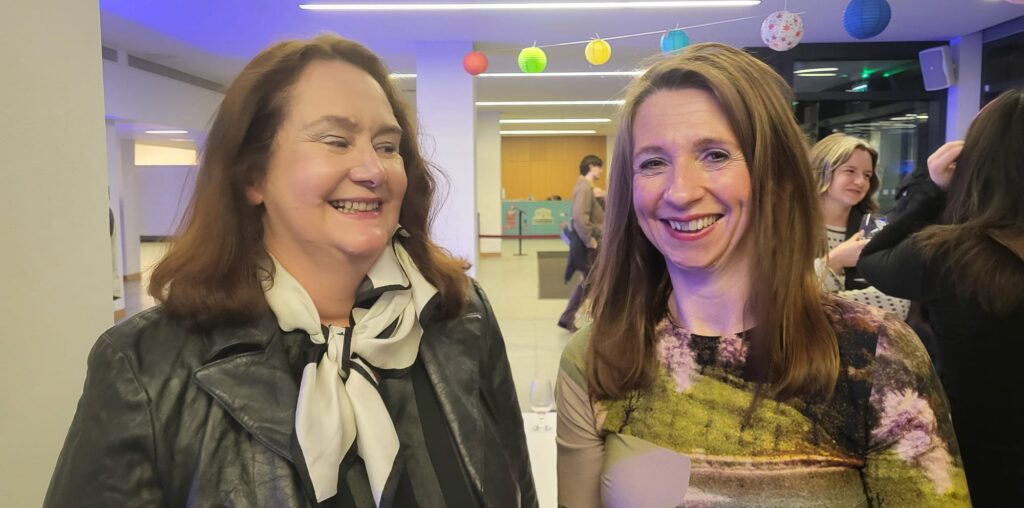
Last weekend, I had the privilege of being part of the line-up at Dublin Book Festival, an annual celebration of all things literary in Ireland’s capital. My event was a discussion of reading the world with Literature Ireland director Sinéad Mac Aodha (pictured with me above), who helped launch Crossing Over at Hodges Figgis last year. But I was lucky to attend several other things thanks to the Literature Ireland team, who took me under their wing for the weekend.
The first of these was the launch of Your Own Dark Shadow: A Selection of Lost Irish Horror Stories at the Gutter Bookshop.
I don’t consider myself a horror fan, but I was intrigued by what editor Jack Fennell said in his speech about how horror is a way of articulating the sense that something is wrong in the world and helping people to feel less alone in this. My fiction bears hallmarks of this, so I am intrigued to see how this plays out in the collection.
I was also deeply impressed by the ethos of the collection’s publisher, Tramp Press, one of a number of indie houses making strides in Ireland. Their submission window is open now, so if you live outside North America and are looking for somewhere to place work, I would recommend checking them out.

The next day I attended an event on short stories with Jan Carson and Mary Costello (pictured above). In the queue outside I was delighted to bump into debut novelist Alan Murrin, with whom I did an event earlier this year. His recommendation of Mary Costello’s story ‘The Choc-Ice Woman’ was so enthusiastic that I lost no time in buying a copy of her latest collection.
The discussion in the event was illuminating and wide-ranging. Jan Carson talked about how word counts were coming down for many journals and competitions. ‘Watch yourself if you’re always writing to fit others’ requirements,’ she said. She explained that the way into stories for her is through concepts, and gave a brilliant example in the shape a story in her latest collection that was commissioned to explore how Northern Ireland is seen in the wake of Brexit. She had approached the subject by envisaging a baby drifting down a river separating the land of two farmer brothers who don’t get on.
Meanwhile, Mary Costello said that for her the spur to writing comes from thinking about the interior lives of her characters. It will often be physical exercise, whether walking or hoovering, that shakes problems loose in her work.
Next up was an event on the essay, chaired by Brendan Barrington, founder editor of The Dublin Review. I found this very inspiring. Over the hour-long discussion, in which panellists shared some of their favourite pieces from the publication, I was struck by the enthusiasm of these writers for this somewhat enigmatic form, and by their openness to people writing in several genres. ‘If you’re a serious writer and you don’t write an essay occasionally, you’re missing a trick,’ said Barrington at one point. I took this as a challenge. Watch this space.
My event was towards the end of the afternoon and it was wonderful to be greeted by an enthusiastic audience, featuring several familiar faces, among them author Rónán Hession, Africa Institute in Ireland programme director Adekunle Gomez and Lyndsey Fineran, who created my literary explorer role at Cheltenham Literature Festival and is now artistic director of the Auckland Writers Festival.
The discussions afterwards were particularly heartwarming. So many readers shared insights about how reading internationally connected to their experience, and I left with a list of book recommendations. I was also particularly delighted to make the acquaintance of translator Signe Lyng, who brings many of Ireland’s most well-known writers’ work into Danish. She subsequently sent me a list of Danish recommendations. I think I feel a book of the month coming on…
I left Dublin inspired and encouraged. What I’d shared in was an event founded on the belief that storytelling is valuable, not for the money it makes but because of the connections it forges – something that I hope also drives my work.
Irish writing has always had an important place on the international stage, and is perhaps enjoying a particularly powerful moment. At Dublin Book Festival, it was not hard to see why.

